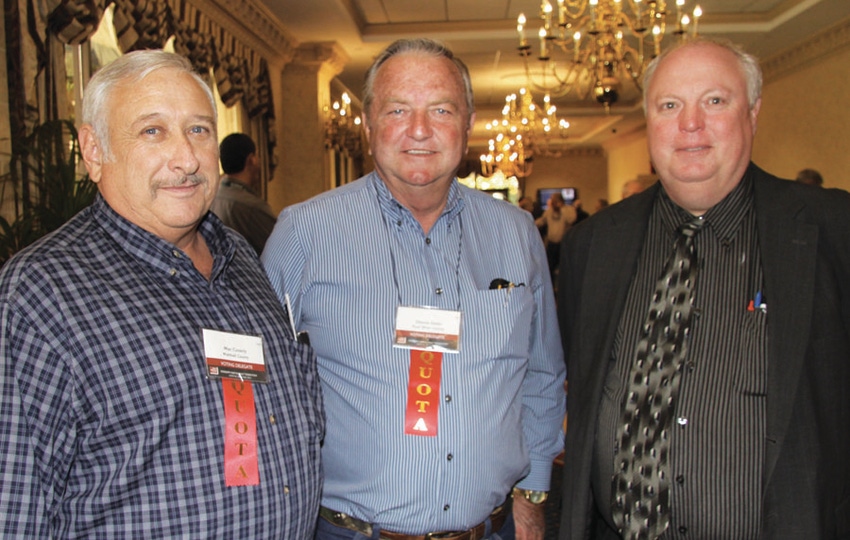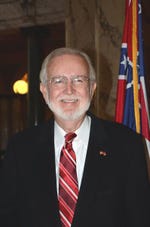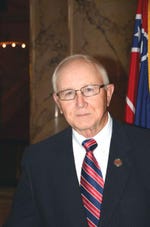
Adding thousands of people to Mississippi’s Medicaid rolls under the Obamacare program would bring “dramatic tax increases, Draconian cuts in services” and “make it even more difficult for you to make a living and raise your children here,” Governor Phil Bryant, told members of the Mississippi Farm Bureau Federation at their annual meeting.


PHIL BRYANT, Mississippi governor
An “epic battle” is under way over adding thousands of people to Mississippi’s Medicaid rolls under the Obamacare program — a move that would bring “dramatic tax increases, Draconian cuts in services” and “make it even more difficult for you to make a living and raise your children here,” the state’s governor, Phil Bryant, told members of the Mississippi Farm Bureau Federation at their annual meeting.
Mississippi’s agriculture industry “will be struggling because of the depth of added entitlement programs,” says Bryant, who has opposed the expansion of the health care program in the state.
At the same time, Mississippi Insurance Commissioner Mike Chaney has proceeded with preliminary steps for an alternative option that would allow the state to operate its own health insurance exchange, saying it would offer the most control and flexibility. Governor Bryant opposes both Obamacare and a health insurance exchange.
With widespread attention in the media about the issue, he told the Farm Bureau group that the president’s program would expand Medicaid in Mississippi by nearly 350,000 recipients. “Add that to the 640,000 we now have on the Medicaid rolls and we’d have nearly a million Mississippians on Medicaid — one out of three citizens of our state.
“Politician after politician has said we can’t turn down that money, that the federal government promises to pay 100 percent the first two years. But we’ll have to take the responsibility after that, and I will tell you now: It will break this state. No money is free; we either have to manufacture it, borrow it, or raise your taxes in Washington D.C.
“I’ve taken the position that we’re not going to expand Medicaid, that we’re going to try to make sure people have some responsibility, that we offer opportunities through employment.
“If we continue to expand entitlements such as Medicaid, what you have to pay in taxes will be so much it will make it even more difficult” for the state’s agriculture, Bryant says.
Shortcomings in education
The governor also said the state’s shortcomings in education will be a barrier to progress if something isn’t done to change the situation.
“We’re in trouble in Mississippi,” he says. “Nearly half of the third grade children in the state — 46 percent — can’t read at a third grade proficiency level.” And he says, an even higher percentage can’t perform at proficiency levels in math or science.
“There’s no way we can maintain achieve the economic goals and opportunities we seek in Mississippi with this type of failure in education.”
His just-unveiled plan for education would, he says, “offer more choices, such as charter schools, in areas where children need them most. We’re going to have to remove school district barriers that are like the Berlin Wall. We’re going to have to pay better teachers more than those that are just doing an average job — paying not for longevity, but what they accomplish in the classroom.
“We need to look at opportunity scholarships to non-public schools for children who want to succeed, but can’t because they’re are trapped in D and F school districts. If we don’t, in 20 years we won’t have a viable work force in Mississippi and no opportunity to attract new industry.”
Bryant, who says a highlight of his weekends is Bush Hogging on the family farm — “When I get off at the end of the day and see that beautifully-cut pasture, there’s a real sense of accomplishment” — says it’s important that “we continue trying to reach out and try to get the media to understand what farming is all about.”
He commended the Mississippi Farm Bureau’s Ag in the Classroom program for its efforts to educate the state’s school children about agriculture’s role in their lives.
“It’s inspirational,” he says, “to see children who haven’t grown up in an agricultural environment, who believe corn comes from cans, and watch the joy on their faces as farmers and their family members explain how it is that they have this bounty of food to enjoy.”
Importance of agriculture
Mississippi’s agriculture industry is responsible for $7.2 billion of income, Bryant notes, more than the legislature’s $5.8 billion budget for the entire state. And about 29 percent of the state’s workforce is directly or indirectly involved in agriculture.
“Everyone gets excited about our aerospace industry, our shipbuilding industry, our auto manufacturing plants, but we should never take for granted out great agribusiness industry,” he says.
At the 2011 Mississippi Agribusiness Summit, Bryant says, “We had some great discussion about what the governor and legislature can do to help promote the state’s agriculture. Messages that came through loud and clear were: Stay out of our way. Let us do our job. Make sure you don’t over-regulate what we’re trying to do. Make sure there are laws to protect us, such as the law we passed to limit the liability of persons involved in the agritourism industry.
“Those of us one generation from the farm could never have conceived that people would bring their children, and pay money, to see what a f arm looks like. But they are doing just that, and agritourism is a growing part of our state’s agricultural economy.”
Mississippi’s abundant forests and pine plantations represent a potential growth industry, Bryant says.
“With the interest in using cellulose to produce fuel, Mississippi’s abundant forests offer opportunities for the future. The Kior Corp., a next generation biofuels company, will soon fill their first tanker with cellulosic fuel at their Columbus plant. “It’s critical that we continue to support a strong forestry/logging community in our state, and vital ag education and research, and I’ve asked our legislature to fully fund the ag units of our state universities.”
Bryant commended Mississippi Farm Bureau for its role in getting an eminent domain referendum on the state’s ballot last year, and helping secure its passage.
“It was an emphatic statement that our people don’t believe the government should take private land and give it to someone else just because it would generate more tax revenue. The influence of Farm Bureau was key to the passage of this legislation.”
Legislators honored
Two ag committee chairmen in the Mississippi legislature were honored by the Farm Bureau organization with its Friend of Agriculture Award for their work on behalf of the state’s farmers.

SEN. BILLY HUDSON
Billy Hudson, Hattiesburg cattleman and chairman of the Senate Agriculture Committee, was recognized for his work on a number of issues, including immigration reform, animal cruelty laws, and agritourism.
“Chairman Hudson has worked hard with Farm Bureau,” said Randy Knight, the state organization’s president. “His work on the issue of animal cruelty helped Farm Bureau come to a compromise on a bill that will protect animals, but also keep farmers in business.”
Hudson represents Senate District 45, comprised of Forrest, Lamar, Pearl River, Perry, and Stone counties. He also serves as vice chair of the County Affairs Committee and is a member of the Finance, Rules, and Conservation and Water Resources Committees.
Rep. Preston Sullivan

REP. PRESTON SULLIVAN
Rep. Preston Sullivan, Okolona cattleman and chairman of the House Agriculture Committee, also was honored with the Friend of Agriculture Award. He represents House District 22, comprised of Calhoun, Chickasaw, and Pontotoc counties, and also serves on the Appropriations and Conservation and Water Resources Committees.
“Chairman Sullivan has worked with us on agritourism, immigration reform, and funding for ag research,” Knight says. “His work on agritourism helped Farm Bureau pass the bill that gives farmers some liability protection when visitors are on their farm.”
Sullivan says giving children firsthand exposure to farms through class trips and agritourism is an excellent way to educate them on the role of agriculture in their lives.
“They’re going to go home tell their mother what a good time they had, what they saw, and what they learned. And the mother is going to tell the father. Things like that are just good ways to promote agriculture.”
About the Author(s)
You May Also Like



